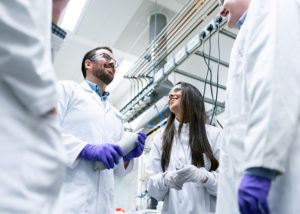By John Wise, Operations Team Member
and Dr. Steve Arlington, President
Pistoia Alliance

Steve Arlington, president, Pistoia Alliance
One of the side effects of the COVID-19 pandemic has been its impact on digital transformation of the workplace and the lab. How and where we work, and how we conduct research, is changing considerably. Developments in technology have delivered significant benefits as we navigate the challenges that the virus has caused. The pressing need to keep R&D programs running and to analyze data at speed, all at social distance, has seen technology adoption skyrocket – from simple video conferencing to keep in touch with colleagues to highly advanced, virtualized technologies for conducting remote clinical trials.

John Wise, Operations Team Manager
The pandemic has also opened many people’s eyes to the possibility of working in life sciences R&D, as they have seen first-hand the positive impact of innovation and disruption in the industry. In particular, the incredible speed of the vaccine breakthroughs made in just ten months has greatly changed perception of the sector. This will have long-term benefits to the life sciences and help attract new industry entrants which are much needed.
Organizations must now focus on cementing the newfound interest of those in other industries, especially in young people, and build training and education programs that keep people interested and engaged with life sciences. This shift of the last year has also shown all of us how future skills needs are changing. Companies must work to ensure they are integrating traditional science skills with digital skills, as well as adopting and incentivizing agile organizational structures that remove innovation roadblocks. This is particularly important as workforces will continue to be dispersed in 2021. Researchers will need to add to their traditional ‘bench’ skills to keep projects moving; they will need digital competencies that allow them confidently and securely to use new technology platforms, and enable data and information sharing with colleagues and collaborators remotely.
Realizing the benefits of technology

In the arena of digital transformation, one area of particular interest is artificial intelligence. RELX’s 2020 Emerging Tech Study (December 2020) showed 76% of healthcare respondents believe AI technologies played a role in slowing the spread of COVID-19. AI technologies are now being used by 81% of those surveyed by RELX in 2020, and AI investment and adoption accelerated during the pandemic. But investment in platforms is only part of the equation, there is an urgent need to develop the skills that equip employees to use such technologies effectively.
Business leaders in all sectors are aware of today’s digital skills gap and the difficulties faced in securing the right skills in the workplace; in PwC’s 2020 CEO survey, 74% of respondents say they are concerned about the availability of skills. Investing in equipping workers with the required skills will therefore be a priority for life sciences organizations in 2021, and given the global economic challenges resulting from the pandemic, upskilling of existing workers has an essential role to play.
What skillsets are required?
A report from the Pistoia Alliance (2030: Life sciences and Health in the Digital Age), considered what the life science, biopharma R&D and healthcare ecosystem will look like in 2030, and what impact this might have on skills requirements. It found that a wider cross-section of skills will become necessary, as breakthroughs increasingly happen at the boundaries between disciplines. This can clearly be seen in the growing interplay between technology and life sciences. From the interest in fields such as quantum computing, computational chemistry and biology, the microbiome, AI/ML and NLP, to the use of smart devices and sensors in healthcare settings and indeed the home. Broadly, the report identified four distinct skillsets that need to be nurtured in today’s life sciences professionals:
-
- Data science skills: adept with AI / ML
- Business skills: domain knowledge (the disciplines within the R&D value chain), communication skills, team building and conflict resolution
- Technical skills: familiarity with cloud-based technology
- Regulation: awareness of the regulatory requirements of working in biopharma R&D
To develop these skillsets, life sciences organizations must focus on upskilling and continuing education of existing employees. While there may always be some specialties that need to be brought in from external sources, it is not a sustainable approach for organizations to always look outside of their own four walls. Upskilling and continuing education is a longer-term and far more cost-effective solution. And, if the industry works together to put in place universal standards and develop curricula pre-competitively, specifically for areas such as data sciences, upskilling can be particularly effective.

An industry-wide culture of mentoring should also be adopted and fostered. With employees now often working remotely, we are in danger of losing the ‘common room connections’ and personal networking that often occurred naturally in the physical workplace. To avoid this issue and to continue to reap the rewards of networking, structured mentoring programs need to be cultivated.
Improving skills boosts employee happiness
Focusing on skills and mentoring will result in a happier, more fulfilled workforce. As referenced in an oft-cited study from the University of Michigan, happier teams are more productive, efficient and creative. In life sciences R&D, the ability to be creative and apply new skills is critical to innovation. The same study also identifies the positive impact that a skills-focused and nurturing environment has on staff attraction and retention. Given the challenges that the life sciences industry faces when competing with industries such as big-tech and fin-tech for digital skills, this cannot be underestimated. The role that pharma and healthcare have played in the pandemic means that there has never been a better time to act. Contributing to society is a key driver of happiness and fulfilment in the workplace and reinforces mental health. As society changes as a result of the pandemic, it is likely many will seek out roles where they can contribute their skills to the greater good.
In order to fill skills gaps and make sure everyone has the opportunity to be upskilled, pharma needs to make sure it reaches all groups, particularly those that are underrepresented in pharma. These are areas where there’s likely a diverse set of skills waiting to be tapped when provided with the right opportunities. At the Pistoia Alliance’s Spring Conference – Collaborate R&D in Action, we are holding a women in STEM event to help to showcase the importance of optimizing our use of talent. Further details can be found here.





when looking at anglophone countries within the commonwealth, consider that an important step is taken for the respective school curricula to prioritize education based on the development of technological skills and competences in the first place and naturally accompanied by the development of scientific ethics, technological ethics, professional ethics and environmental ethics. In contrast, the rest of the countries in the world insist on continuing with valid school curricula within their national limits. Globalization is an extremely important step towards a more or less globalized curriculum, naturally accompanied by the proper transfer of knowledge and technology to less developed countries; therefore, it will be worthless that some economic blocs advance grant from the rest of the world. A workforce must be able to migrate in all directions of the world.